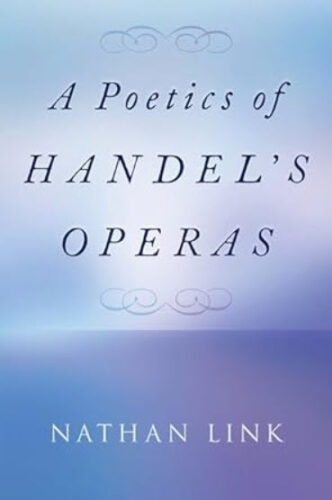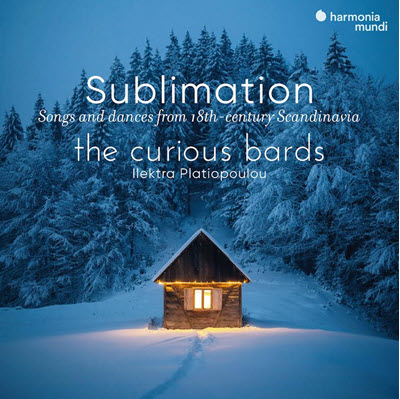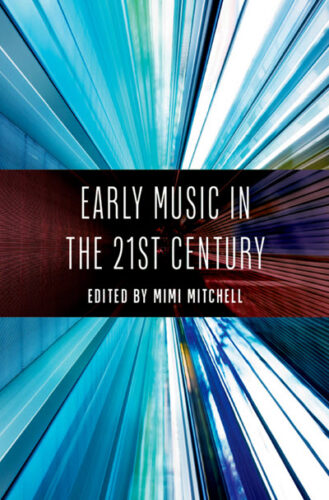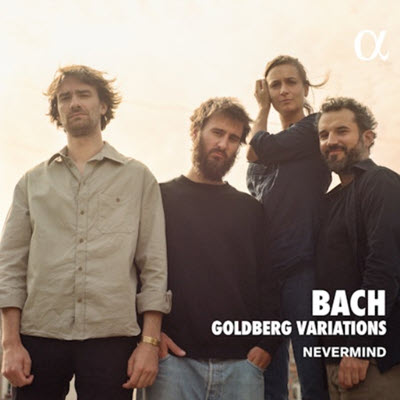by Wendy Heller
Published August 5, 2024
A Poetics of Handel’s Operas by Nathan Link. Oxford University Press, 2023.
In May of 1942, the musicologist Paul Henry Lang wrote an article in the New York Times suggesting that performances of Handel’s operas might eventually become popular among musicians and audiences. In response, fellow musicologist Paul Nettl penned a blistering indictment. While he admitted that the “sublimely beautiful melodic structure moves and even excites us,” the problem is the “uninterrupted alternation of simple or accompanied recitative and aria.” Nettl observed that this might have been “endurable for the Baroque listener who admired alone the beauty and artistry of the voice,” but the monotony would not suffice for modern listeners who knew Gluck, Mozart, and (of course) Wagner, adding: “We cannot listen for two hours to insane love, longing for death, murderous lust, and intrigue in the form of only recitative and aria.”

Nettl, needless to say, has been proven wrong. If the revival of Baroque opera has been one of the most significant legacies of the historical performance movement, Handel has been the most fortunate recipient of attention. Handel’s operas are being performed in new productions with superb singers throughout the world, attracting enthusiastic audiences and stellar reviews from critics who long ago stopped complaining of the presumed tedium of the da capo aria. There is no question that excellent singing (especially the generation of countertenors) is part of the allure. But there is something more at work here. Handel’s operas also tell vivid stories, albeit in a complex, even idiosyncratic manner that is not readily apparent to even the passionate Handel fan.
Nathan Link’s brilliant new book, A Poetics of Handel’s Operas, unlocks these and other secrets of Handel’s operas, providing his readers with an eloquent, passionate, and meticulous account of the narrative processes at work in such pieces as Giulio Cesare, Rodelinda, Orlando, and Tamerlano. At the heart of this remarkable study are some fundamental questions that we might ask about any opera, but are particularly important for opera seria: How are stories told in Handel’s operas? In a genre in which singing is norm, when do characters actually sing and when do they speak? How do audiences experience the passage of time, interpret the contributions of the orchestra, or differentiate the star singer from the character she is playing?
Rejecting simplistic accounts of 18th-century opera (e.g., all arias express the inner feelings of a character, bringing the dramatic clock to a complete halt), Link exposes the multiple layers that sit between the story and the way in which it is represented: arias might indeed express a character’s deepest feeling, but they might also represent moments in which characters are actually singing, so that fellow characters (and the audience) experience it in real time as a genuine performance. Moreover, even though time can come to a halt during an aria and speed up during the recitative, Link shows how the relationship between the actual passage of time in the theater (“clock-time”) and time within the story (“story-time”) is especially complex — there are pauses and stretches within arias, and even moments with implicit action. No less complex is the role of the orchestra, which can tell aspects of the story by evoking the sounds of nature, by seemingly to be in dialogue with the singer by means of an obligato accompaniment, or even by establishing an affect that contradicts the words being sung.

Link’s chapter on “Character” delves into the inevitable tension between the dramatic character and the actual singer who is playing the role — at what point in the telling of the story, for instance, did the celebrated castrato Senesino or soprano Francesco Bordoni become the actual protagonist, eclipsing the characters they were presumably playing? A final chapter, “Storytelling,” explores how the story is being told, and who is telling it — the composer, the librettist, the orchestra, or a combination thereof — implying that with Handel operas (and perhaps those by other composers) these various authorial voices can get conflated. The audience can also add its own voice, since it brings to the theater a knowledge that inevitably shapes the understanding of the drama and all of its elements.
Despite the complexity of the issues and the necessarily close readings that Link provides of key passages in Handel’s operas, the writing is clear and accessible, and the audio examples on the companion website make the reading experience that much more pleasurable. Link brings to this project not only an encyclopedic knowledge of Handel’s operas and narrative theory, but also makes his readers’ experience that much more vivid by calling upon a vast body of examples — including classical literature, Shakespeare plays, novels, and film — all of which use some of the same narrative strategies as does Handel. We thus come to understand similarities between Homer’s description of Achilles’ shield in the Iliad, which exists outside the story, and the peculiar role of one of the most beloved arias from Giulio Cesare, “Va tacito e nascosto” (with the beguiling horn obligato), which may be sung by the eponymous hero, but “transcends” the character’s situation by providing commentary. The author is particularly deft at using examples from film to highlight his points, such as the flash-back and flash-forward techniques in Rocky (1976), or the narrative voice-over in many movies.
A Poetics of Handel’s Operas is a book that speaks eloquently to a broad audience. While it will certainly attract the attention of scholars dealing with opera, theater, and narrative, and likely to have a strong impact on opera scholarship writ large, it is essential reading for the stage directors, conductors, musicians, and singers performing Handel’s opera as well as the audience members who are passionate about this repertory. And I am hopeful that it might actually change the minds of those opera critics who share Paul Nettl’s views about the impossibility of enjoying Handel in the post-Wagnerian world. Handel has great stories to tell that are both dramatically and musically compelling — we just need to know a bit more about how to appreciate fully this special brand of drama and bring it to life on the stage.
Wendy Heller is the Scheide Professor of Music History at Princeton University. She is currently completing a critical edition of Handel’s Admeto for Bärenreiter. For EMA, she recently wrote about listening anew to Mozart’s Don Giovanni.




